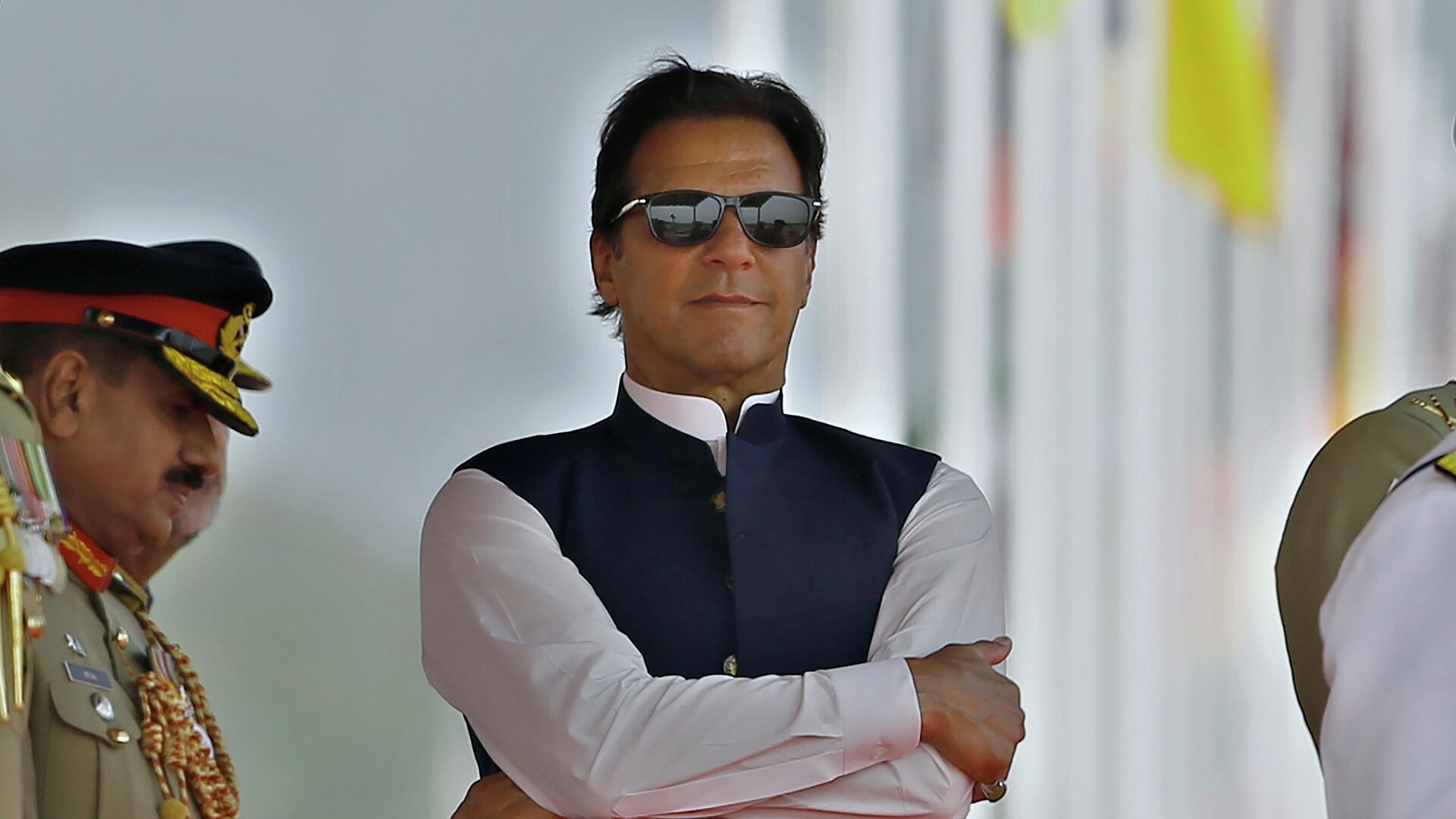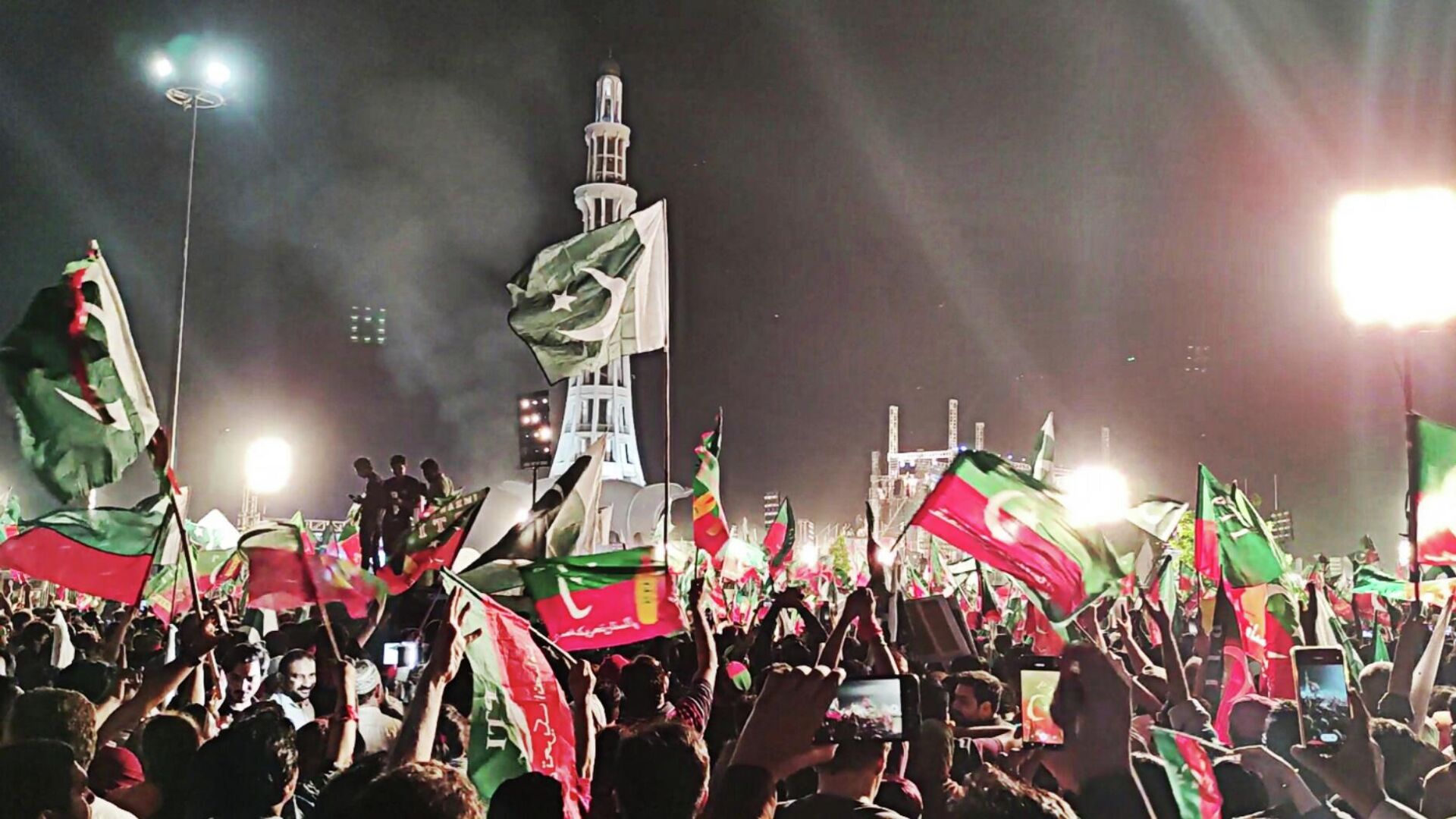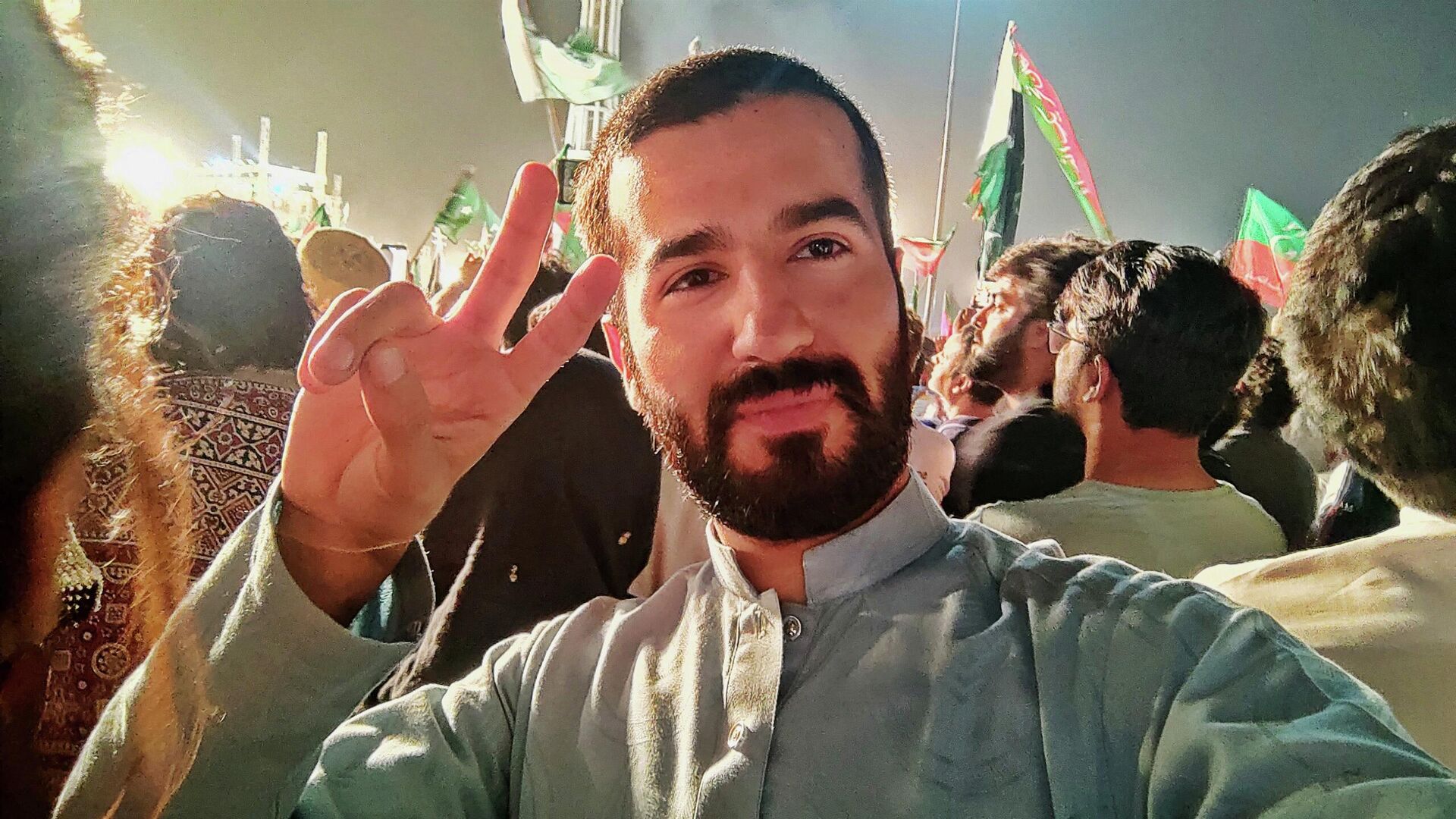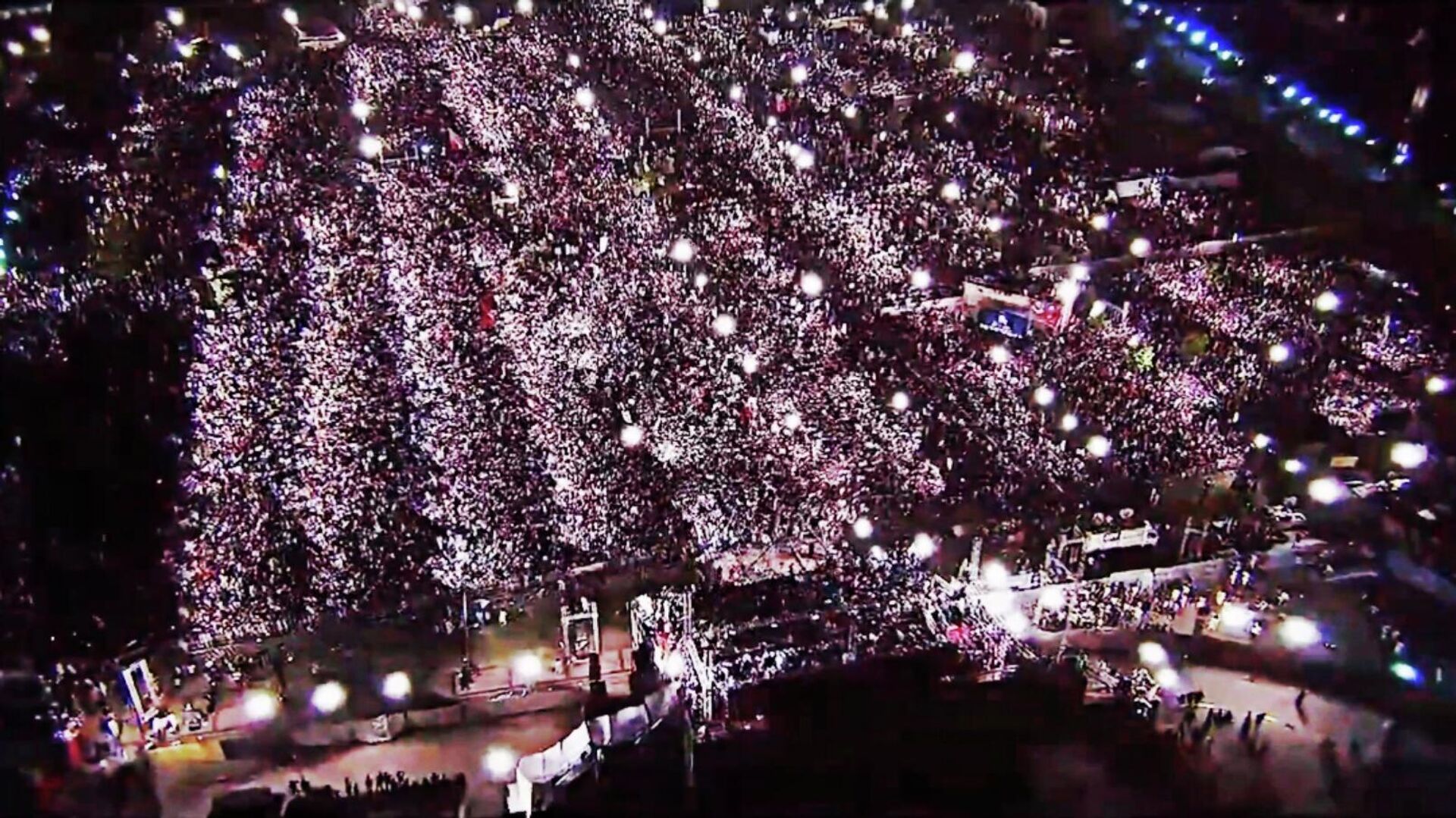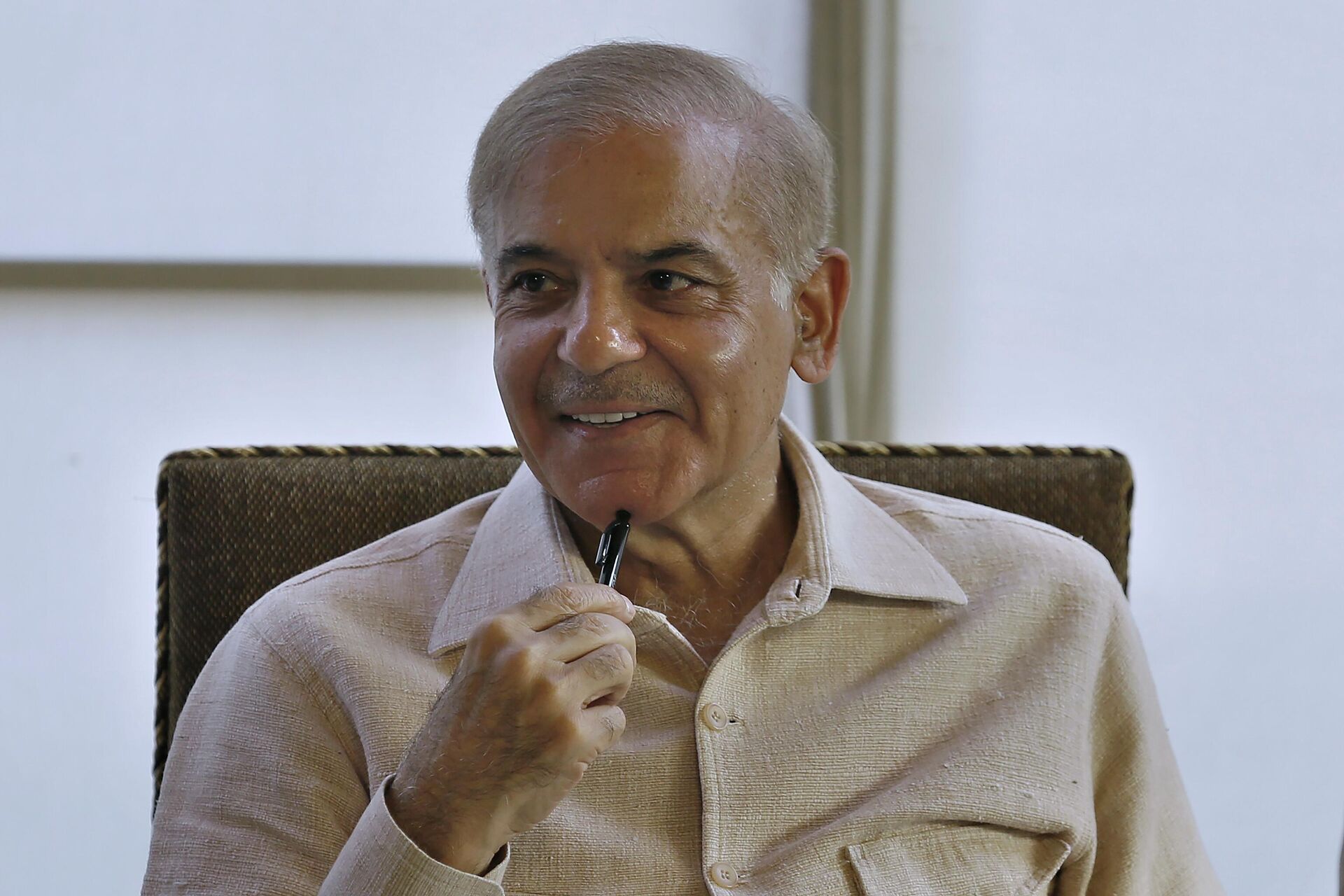https://sputnikglobe.com/20220424/in-two-months-imran-khan-can-checkmate-new-pakistani-pm-through-large-public-rallies-scholar-says-1095013549.html
In Two Months Imran Khan Can Checkmate New Pakistani PM Through Large Public Rallies, Scholar Says
In Two Months Imran Khan Can Checkmate New Pakistani PM Through Large Public Rallies, Scholar Says
Sputnik International
Former Prime Minister Imran Khan is continuing a nationwide campaign for snap elections following his ouster through a no-confidence vote earlier this month... 24.04.2022, Sputnik International
2022-04-24T14:36+0000
2022-04-24T14:36+0000
2023-07-31T17:15+0000
us
asia
imran khan
islamabad
corruption
rally
us state department
inflation
pakistan
shehbaz sharif
https://cdn1.img.sputnikglobe.com/img/07e6/04/09/1094627266_0:0:3073:1728_1920x0_80_0_0_6c0a8e5b8e45dac448b5969fb0054a73.jpg
"Lahore is considered as the centre of Pakistan’s political history", says Sabtain Ahmed Dar, a Pakistan-based academic and political scientist. "The site for Imran Khan’s rally was Minar-e-Pakistan which is a national monument located in Greater Iqbal Park, Lahore. This monument was built in eight years from 1960 to 1968 on the site where the founder of Pakistan, Muhammad Ali Jinnah with his All-India Muslim League passed the Lahore Resolution on 23 March 1940. This resolution was later declared as the Pakistan Resolution. Jinnah for the first time heralded for a new homeland for the Muslims of Hind, as adopted in the two-nation theory. This resolution subsequently supported the Pakistan movement and since then the site has always been potent for political rallies".Following Khan's ouster through a no-confidence vote in the National Assembly on 9 April, the 342-seat Pakistani parliament cast 174 votes on 11 April for Shehbaz Sharif, the leader of Pakistani Muslim League- Nawaz (PML-N), to become the country's new prime minister. Imran Khan, the chairman of the Pakistan Tehreek-i-Insaf (PTI) party, argues that his removal was nothing but a US-backed coup d'etat. He quotes a "threat letter" allegedly blackmailing Islamabad into removing him from power. The PTI chairman launched a series of nation-wide rallies, galvanising hundreds of thousands and calling for early elections.Like his 20th century predecessors, Imran Khan is advancing an idea of Pakistan's independence from major powers, says Dar. Even though the country is facing economic hurdles including soaring inflation, the idea of sovereignty has strongly resonated with millions of Pakistanis, according to the political scientist.Dar notes that during the Lahore rally, the PTI leader compelled his compatriots "to not live as slaves of the United States". Khan highlighted that a Muslim cannot have a mentality of a slave; that a Muslim must obey God, not the US establishment, according to the academic. At the same time, the former prime minister underscored that Pakistan should be ready to maintain working relations with all nations on the principle of equality.Khan's Twitter RalliesIn addition to nationwide rallies, Imran Khan has also instrumentalised social media platforms to promote his agenda. On 20 April, the PTI chief held his first-ever audio session on Twitter Spaces, bringing together half a million people from across the world, Daily Pakistan reported, citing PTI leader Dr Arslan Khalid. "A max of 162,000 listeners at one time while 500,000 tuned in during the one hour session", Khalid tweeted on Wednesday.For its part, the new Pakistani government is trying to thwart Khan's popularity by bringing forward corruption accusations against him, according to the political scientist. In particular, the country’s governing party PML-N has accused Khan of financial irregularities as well as theft of over $1.6 million from domestic and foreign funds."This issue had already been brought to the fore in the Pakistani Election Commission’s foreign funding case", says Dar. "According to the report presented by the investigators to the PEC judges, a bank statement of the State Bank of Pakistan (SBP) revealed that the PTI received Rs 1.64 billion in funds, of which more than Rs 31 crore was unaccounted for".Per the political scientist, the matter has to be investigated thoroughly in the first place. "Is Khan really to blame for all this? The judges will decide", he says.PTI Calls for Publicly Investigating Foreign InterferenceMeanwhile, the Shehbaz Sharif government is insisting that Khan's accusations of collusion between the Pakistani opposition and the US to oust him are null and void. On 22 April, PM Sharif chaired the first meeting of the National Security Committee (NSC) , which concluded that there was no foreign conspiracy behind the ouster of the PTI-led government, according to the press release issued by the Prime Minister Office. On 23 April, US State Department deputy spokesperson Jalina Porter said that the Biden administration had welcomed the statement.However, Imran Khan and the PTI argue that before the coup d'etat, the NSC took the "threat letter" and alleged foreign interference in Pakistan's affairs very seriously. "The Committee decided that Pakistan will issue a strong demarche to the country in question both in Islamabad and in the country’s capital through proper channels in keeping with diplomatic norms", said the 31 March press release of the meeting between the NSC and then-PM Imran Khan.After PM Sharif's Friday gathering with the NSC, former foreign minister Shah Mehmood Qureshi called for appointing "an empowered judicial commission" to investigate the matter as well as the apparent attempts to sweep the case under the rug, according to The Express Tribune. Qureshi insisted that the judicial commission's investigation needs to be public. "There is no scope of closed-door or secret proceedings and if conducted in such a manner, will not be accepted," the former foreign minister said.What's Next for Sharif and Khan?The new Pakistani government has a lot of challenges ahead, according to Dar.According to the political scientist, the situation will be driven by two categories of factors, i.e. international and domestic. First, the US factor has always been the most significant one, not only in the form of military partnership but also in financial and economic partnership."The United States still remains the largest exporting market of Pakistan", Dar highlights.Despite Washington's denials, the US is the only country that has benefited the most from ousting Khan, an independent and non-establishment Pakistan leader, according to the academic."As the US has achieved her task, it would want to see normalisation in Pakistan", Dar notes. "The help from the International Monetary Fund (IMF) can come in the form of new funds and relaxation in debt payments".Meanwhile, within Pakistan the political situation will get worse as both parties will not be ready to accept each other’s reality, according to the political scientist. He predicts that the incumbent government would try to get Khan smeared and convicted in some alleged corruption cases to upend his popularity.Sabtain Ahmed Dar is a Pakistan-based academic and political scientist. He teaches history and international relations at the School of Integrated Social Sciences at the University of Lahore. He is a senior fellow at the Centre for Security, Strategy, and Policy Research (CSSPR) and contributes at the National Security Division think-tank of Pakistan.
islamabad
pakistan
Sputnik International
feedback@sputniknews.com
+74956456601
MIA „Rossiya Segodnya“
2022
News
en_EN
Sputnik International
feedback@sputniknews.com
+74956456601
MIA „Rossiya Segodnya“
Sputnik International
feedback@sputniknews.com
+74956456601
MIA „Rossiya Segodnya“
us, imran khan, islamabad, corruption, rally, us state department, inflation, pakistan, shehbaz sharif, x (formerly twitter), coup d'etat
us, imran khan, islamabad, corruption, rally, us state department, inflation, pakistan, shehbaz sharif, x (formerly twitter), coup d'etat
In Two Months Imran Khan Can Checkmate New Pakistani PM Through Large Public Rallies, Scholar Says
14:36 GMT 24.04.2022 (Updated: 17:15 GMT 31.07.2023) Former Prime Minister Imran Khan is continuing a nationwide campaign for snap elections following his ouster through a no-confidence vote earlier this month. On 21 April, Pakistan Tehreek-e-Insaf (PTI), held a massive rally at Minar-i-Pakistan in Lahore, with Khan calling his supporters to resist the "imported government" of Shebhaz Sharif.
"Lahore is considered as the centre of Pakistan’s political history", says Sabtain Ahmed Dar, a Pakistan-based academic and political scientist. "The site for Imran Khan’s rally was Minar-e-Pakistan which is a national monument located in Greater Iqbal Park, Lahore. This monument was built in eight years from 1960 to 1968 on the site where the founder of Pakistan, Muhammad Ali Jinnah with his All-India Muslim League passed the Lahore Resolution on 23 March 1940. This resolution was later declared as the Pakistan Resolution. Jinnah for the first time heralded for a new homeland for the Muslims of Hind, as adopted in the two-nation theory. This resolution subsequently supported the Pakistan movement and since then the site has always been potent for political rallies".
Following Khan's ouster through a no-confidence vote in the National Assembly on 9 April, the 342-seat Pakistani parliament cast 174 votes on 11 April for Shehbaz Sharif, the leader of Pakistani Muslim League- Nawaz (PML-N), to become the country's new prime minister. Imran Khan, the chairman of the Pakistan Tehreek-i-Insaf (PTI) party, argues that
his removal was nothing but a US-backed coup d'etat. He quotes a "threat letter" allegedly blackmailing Islamabad into removing him from power. The PTI chairman
launched a series of nation-wide rallies, galvanising hundreds of thousands and calling for early elections.
Like his 20th century predecessors, Imran Khan is advancing an idea of Pakistan's independence from major powers, says Dar. Even though the country is facing economic hurdles including soaring inflation, the idea of sovereignty has strongly resonated with millions of Pakistanis, according to the political scientist.
Dar notes that during the Lahore rally, the PTI leader compelled his compatriots "to not live as slaves of the United States". Khan highlighted that a Muslim cannot have a mentality of a slave; that a Muslim must obey God, not the US establishment, according to the academic. At the same time, the former prime minister underscored that Pakistan should be ready to maintain working relations with all nations on the principle of equality.
"The main message of Imran Khan to the public is to condemn the US conspiracy against him and join hands with the public to compel the US-backed government to have early elections", says Dar.
In addition to nationwide rallies, Imran Khan has also instrumentalised social media platforms to promote his agenda. On 20 April, the PTI chief held his first-ever audio session on Twitter Spaces, bringing together half a million people from across the world, Daily Pakistan
reported, citing PTI leader Dr Arslan Khalid. "A max of 162,000 listeners at one time while 500,000 tuned in during the one hour session", Khalid tweeted on Wednesday.
"It is true Imran Khan’s main struggle will be through social media as from the mainstream media in Pakistan he has been marginalised since the opposition has come into power," says Dar. "The mainstream media in Pakistan is not covering his public rallies. He recently broke global records on Twitter Space for hosting almost 165k listeners. On average he is receiving 100k to 200k+ reactions on each of his Facebook posts which is a huge number".
For its part, the new Pakistani government is trying to thwart Khan's popularity by bringing forward corruption accusations against him, according to the political scientist. In particular, the country’s governing party PML-N has accused Khan of financial irregularities as well as theft of over $1.6 million from domestic and foreign funds.
"This issue had already been brought to the fore in the Pakistani Election Commission’s foreign funding case", says Dar. "According to the report presented by the investigators to the PEC judges, a bank statement of the State Bank of Pakistan (SBP) revealed that the PTI received Rs 1.64 billion in funds, of which more than Rs 31 crore was unaccounted for".
Per the political scientist, the matter has to be investigated thoroughly in the first place. "Is Khan really to blame for all this? The judges will decide", he says.
PTI Calls for Publicly Investigating Foreign Interference
Meanwhile, the Shehbaz Sharif government is insisting that Khan's accusations of collusion between the Pakistani opposition and the US to oust him are null and void.
On 22 April, PM Sharif chaired the first meeting of the National Security Committee (NSC) , which concluded that there was no foreign conspiracy behind the ouster of the PTI-led government,
according to the press release issued by the Prime Minister Office. On 23 April, US State Department deputy spokesperson Jalina Porter said that the Biden administration had welcomed the statement.
However, Imran Khan and the PTI argue that before the coup d'etat, the NSC took the "threat letter" and alleged foreign interference in Pakistan's affairs very seriously. "The Committee decided that Pakistan will issue a strong demarche to the country in question both in Islamabad and in the country’s capital through proper channels in keeping with diplomatic norms",
said the 31 March press release of the meeting between the NSC and then-PM Imran Khan.
After PM Sharif's Friday gathering with the NSC, former foreign minister Shah Mehmood Qureshi called for appointing "an empowered judicial commission" to investigate the matter as well as the apparent attempts to sweep the case under the rug,
according to The Express Tribune. Qureshi insisted that the judicial commission's investigation needs to be public. "There is no scope of closed-door or secret proceedings and if conducted in such a manner, will not be accepted," the former foreign minister said.
What's Next for Sharif and Khan?
The new Pakistani government
has a lot of challenges ahead, according to Dar.
"The current government can fail terribly if they do not solve fiscal issues before the national budget announcement in July", says the political scientist. "In the coming two months Imran Khan can checkmate the opposition through large public rallies and the general public will not be willing to support PM Shahbaz Sharif and his party in the next elections".
According to the political scientist, the situation will be driven by two categories of factors, i.e. international and domestic. First, the US factor has always been the most significant one, not only in the form of military partnership but also in financial and economic partnership.
"The United States still remains the largest exporting market of Pakistan", Dar highlights.
Despite Washington's denials, the US is the only country that has benefited the most from ousting Khan, an independent and non-establishment Pakistan leader, according to the academic.
"As the US has achieved her task, it would want to see normalisation in Pakistan", Dar notes. "The help from the International Monetary Fund (IMF) can come in the form of new funds and relaxation in debt payments".
Meanwhile, within Pakistan the political situation will get worse as both parties will not be ready to accept each other’s reality, according to the political scientist. He predicts that the incumbent government would try to get Khan smeared and convicted in some alleged corruption cases to upend his popularity.
"Khan would continue to galvanize the masses in his favor to have early elections", Dar says. "Khan's fight had already put the 1973 constitution of Pakistan in an awkward situation. To me Pakistan will face a second wave of constitutional crisis soon when the judges will review the petition of the threat letter. If the decision declares that the US was involved in the overthrow of Khan’s administration then a new wave of crisis will emerge. That crisis will decide the course of the next political struggle in Pakistan".
Sabtain Ahmed Dar is a Pakistan-based academic and political scientist. He teaches history and international relations at the School of Integrated Social Sciences at the University of Lahore. He is a senior fellow at the Centre for Security, Strategy, and Policy Research (CSSPR) and contributes at the National Security Division think-tank of Pakistan.
